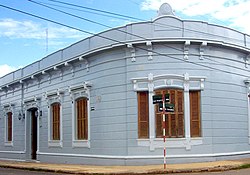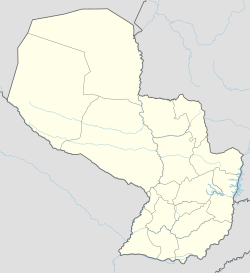Villarrica, Paraguay
| Villarrica | |||
|---|---|---|---|
| City | |||
Villarrica del Espíritu Santo 
|
|||
 |
|||
|
|||
| Coordinates: 25°45′S 56°26′W / 25.750°S 56.433°WCoordinates: 25°45′S 56°26′W / 25.750°S 56.433°W | |||
| Country |
|
||
| Department | Guairá | ||
| Founded | May 14, 1570 | ||
| Founded by | Ruy Díaz de Melgarejo | ||
| Government | |||
| • Intendente Municipal | Federico Alderete Guggiari | ||
| Area | |||
| • Total | 247 km2 (95 sq mi) | ||
| Elevation | 180 m (590 ft) | ||
| Population | |||
| • Total | 56,385 | ||
| • Density | 230/km2 (590/sq mi) | ||
| Time zone | AST (UTC-04) | ||
| • Summer (DST) | ADT (UTC-03) | ||
| Postal code | 5000 | ||
| Area code(s) | (595) (541) | ||
Villa Rica del Espíritu Santo, using its formal name is a city located in the middle of the Oriental Region of the Paraguayan territory, it is the capital of the Guairá Department. It was founded by the Spanish Captain Ruy Diaz de Melgarejo on May 14, 1570 in the old Guaira, today in Brazilian territory.
Villarrica has many places that honor the Paraguayan culture, such as the monument to the memory of Manuel Ortiz Guerrero, honorary citizen of the city. About this city Bacón Duarte Prado (journalist and musician) wrote: Villarrica is the city of the eternal youth, born from the waters of the Ycuá Pytá and the breeze that comes from the hills.
Founded by the Spanish Ruy Diaz de Melgarejo, 350 km east from the Saltos del Guaira, on May 14, 1570, with the name Villa Rica del Espíritu Santo (Villa Rica of the Holy Spirit), finally settled in 1682 in the hills near the Ybytyruzu, part of the Caaguazú Cordillera, 180 m above ocean level.
The city is located near the Ybyturuzú, part of the Caaguazú mountain chain. The land is elevated, rough and wooded, appropriate for cultivate of sugar cane, trees for wood and cattle.
In the 16th century, Ruy Díaz de Melgarejo left Ciudad Real with 40 men and 53 horses to the East, where they expected to find mines of gold and silver. After arriving in the lands of Cacique (Chief) Cuaracyberá, he founded on May 14, 1570 a new town, chriztened Villa Rica del Espíritu Santo. It was named that way because the belief that there was abundant gold and silver in the area and also because the foundation occurred in the proximities of this religious festivity. Due to the constant invasions Paulist Bandeirantes, the city had to be moved seven times before settling in a definite place. For this reason it received the name of “Wandering city”.
In 1592, Ruy Díaz de Guzman moved the city 100 km east. In 1599 he moved it again, this time near the Mboteitei River, 100 leagues from Asunción. After long years of peaceful existence, the city was invaded in 1632 by the Mamelucos, and after 4 years of pilgrimage the population settled in the closeness of Mbaracayú. Two years later, the Governor Valderrama determined to situate it in the fields of Yarú. In 1642 the population migrated again to Curuguaty.
In 1678 the population settled close to the Tobatyry River, a place called “Espinillo”, but the soil was no good for agriculture so many people decided to organize and do a recognition expedition to the area beyond the Tebicuary River. They found fertile land near Ybyturuzú, so they requested the Governor authorization to move the city to that place. On May 25, 1682, he gave licence to establish in Ybyturuzú, only if the King approved it too, which he did on May 14, 1701. This date became the definite date of foundation. The Franciscan Missioners helped the consolidation of the city, founding a Guaraní Mission in Itapé.
...
Wikipedia



